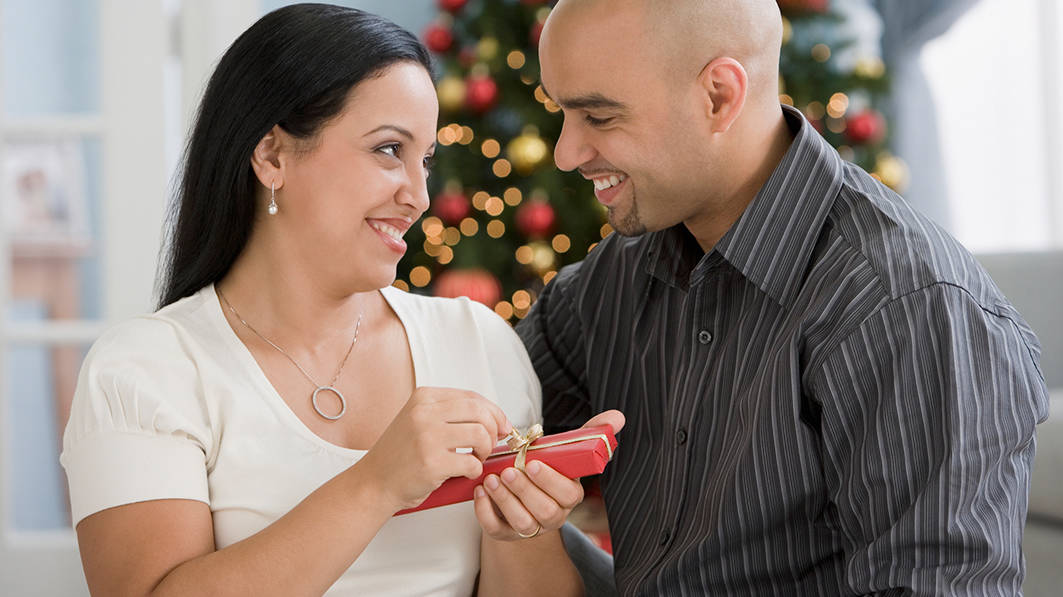You almost expect a few duds every Christmas. The pink and green potholders from Aunt Sarah. The as-seen-on-TV wonder gadget from Uncle Dan. Books you’ll never read, clothes you’ll never wear — in a Christmas culture saturated with gift exchanges, it’s inevitable that a few presents will leave you scratching your head. Still, you smile and offer your thanks, telling yourself that the well-intentioned giver probably just doesn’t know you that well.
Sometimes, however, those dud gifts aren’t so easy to shrug off, especially when they come from the one person who is supposed to know you best: your spouse. It doesn’t matter how long you’ve been married or how deeply you think you know each other, chances are good your spouse will at some point buy you a present that’ll have you sifting through the paper scraps to find a gift receipt.
Worse than that initial disappointment, though, are the feelings that your spouse doesn’t have a clue about you or your interests: “Does he really think I wear a size 14?” “I can’t believe she thinks I’ll read this.” “Golf clubs? Really? Are these for me or for him?”
And then there’s the other side of the equation: your experience as a giver. There will be times when you’re excited about that “perfect” gift you’ve found, only to see from the look on your spouse’s face that it will probably end up collecting dust on a closet shelf. That less-than-enthusiastic reaction can leave you feeling deflated and unappreciated.
Christmas is a season for peace, a time for warm family memories and remembrance of our Savior’s arrival on Earth. It shouldn’t be a time when conflict is triggered by little things wrapped in pretty paper. So here are a few reminders to help you steer clear of gift-giving hard feelings between you and your spouse this Christmas:
Spend more time learning, less time shopping.
Try to avoid those extended shopping trips where you hope to stumble upon an acceptable gift. Instead, establish a habit of educating yourself about your spouse’s hobbies and other interests. Look through his or her catalogs. When you go shopping together, notice the items that catch your spouse’s eye. Ask questions. Do your homework on GPS fish finders or scrapbooking materials. While your research may not guarantee your gift will be a hit, it will communicate to your spouse that you earnestly value his or her interests.
Don’t expect your spouse to read your mind.
Let’s see if I can say this without generalizing too much: Men often have a difficult time knowing what gifts their wife would like. As a member of the male gender, I’ve been there before. We sort through our memories of the past couple of months, trying to decipher whatever vague gift hints were floated our way, but more often than not, our offerings fall short of what our wife was expecting. (And for me, “fall short” really means “fail spectacularly.”)
So if you know of a few things that you’d really like for Christmas this year, make sure your spouse knows as well. For many husbands (and yes, many wives) no hint is too obvious. Spell it out. Give each other catalog clippings, if necessary, or links to online wish lists.
Get on the same budget page.
The rough condition of the economy will undoubtedly affect everyone’s holiday this year. And even in good times, money spent on gifts can be a sore point in marriages, whether it’s one spouse being a little too thrifty or another busting the bank on big-ticket gifts. So when you’re talking about Christmas lists and other holiday plans, make sure you’re operating with the same budget in mind. At the very least, establish a limit to how much you’ll spend on each other.
Remember, it’s not (always) about you.
Sure, it’s a gift, something that’s supposed to bring you a little happiness. But there is an often-forgotten side to the whole gift-giving tradition: Gifts are a little part of the giver as well. So even though it isn’t the CD or the hobby gear that you might have chosen for yourself, take a moment to consider that your spouse might have hoped to share something that is meaningful to him or her, possibly as a way to spend quality time together. And isn’t that a big part of marriage?
Vance Fry is senior associate editor of Focus on the Family magazine.
If you enjoyed this article, read more like it in Focus on the Family’s marriage and parenting magazine. Get this publication delivered to your home by subscribing to it for a gift of any amount.




















